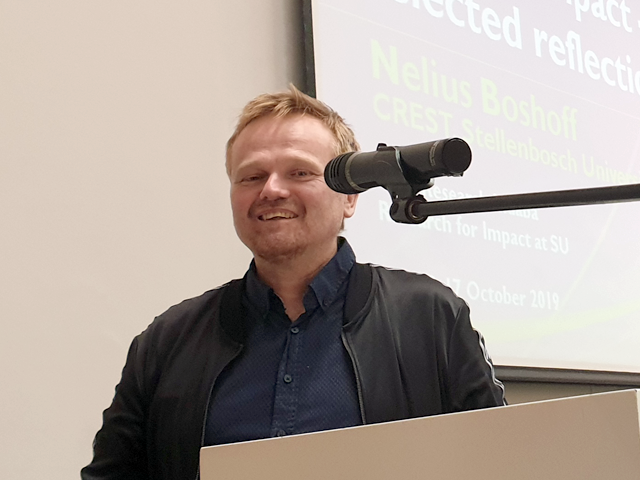17 October 2019
CREST researcher Professor Nelius Boshoff was a keynote speaker at the 2019 Research Indaba at Stellenbosch University on 17 October 2019. In line with the current strategic direction at the University, his mandate was to focus on current scholarly perspectives on the notion of ‘research impact’.
‘Impact’ has become a keyword in research circles around the world. Nowadays, institutions and individual researchers are eager to demonstrate the impact of their research. This trend is driven by a number of factors including (1) pressure to demonstrate accountability and the value of research; (2) the need to manage institutional performance; (3) making a case for research investments; and (4) understanding how research leads to positive impacts.
However, defining research impact is complex. Research impact goes beyond measuring the outputs and outcomes of research, Professor Boshoff explained. It is about whether research results in changes in awareness, knowledge and understanding, ideas, attitudes and perceptions, policy and practice. Understandably, measuring such changes are particularly challenging. In his presentation he outlined several current approaches that help us to conceptualise research impact and propose models that can be used to understand these processes.
Going beyond scientific impact measured by traditional research outputs and citations, research impact should also look at the wider uptake and use of research, as well as its impact on broader society. These so-called ‘broader impacts’ are typically more difficult to monitor and measure compared to counting publications or citations. However, during a discussion with researchers who attended the indaba, it became clear that there is a demand for bringing broader societal impacts into the picture when developing indicators for research impact.
In a subsequent panel discussion, other leading researchers at the University also focused on the idea of giving something back to society as part of research impact. Prof Nox Makunga (plant scientist) spoke about the importance of making research publicly visible, while Professor Jimmy Volmink (Dean of the Health Science Faculty) highlighted the power of telling good research stories as a way to give something back to public audiences.
It also became clear that research impact is understood differently across within and across faculties. A strong plea from some participants focused on the dangers of neglecting fundamental research when the focus is on research that has short-term impact.



